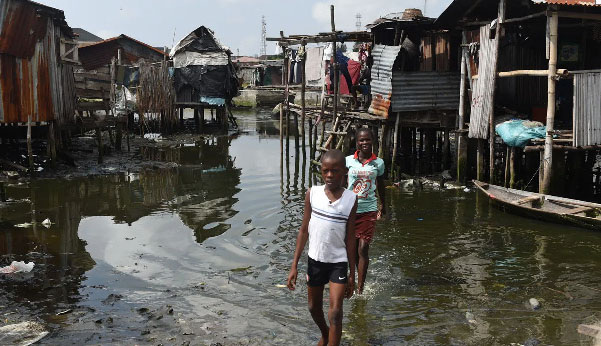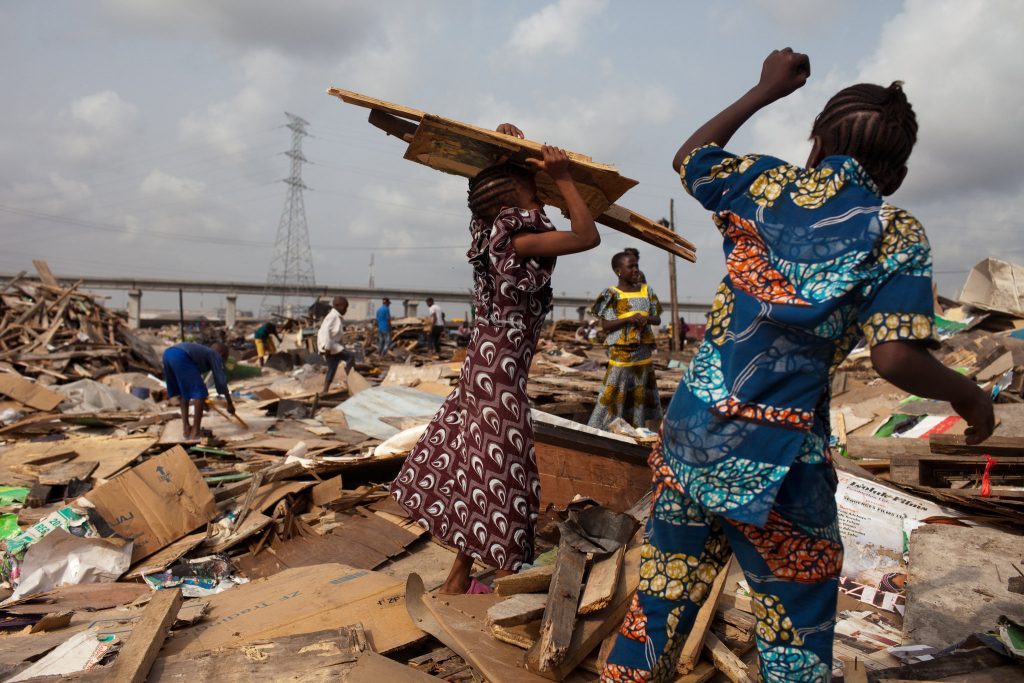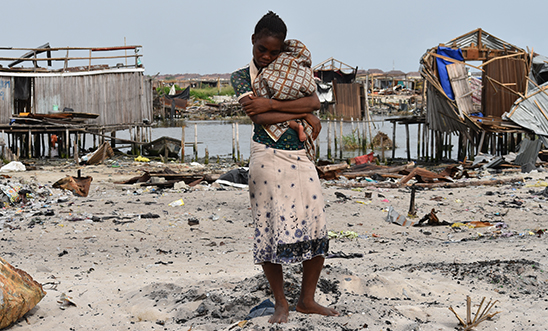Learn about homelessness in Nigeria, as well as its causes and effects.
Homelessness is a global pandemic, and Nigeria, being Africa’s most populous country, is not without cases of people without housing. While it’s the largest economy in Africa, Nigeria’s homelessness is alarming.
The International Human Rights Commission (IHRC), a non-political Transnational Intergovernmental Organization, affirmed recently that “Nigeria has a growing number of homeless people with its housing deficit now standing at 28 million.” 13% of Nigerians are homeless.
Homelessness in Nigeria

Homelessness, it must be mentioned, happens in different forms. While the layman may casually assume that homelessness refers to persons living in the streets, houselessness can also be in the form of people living in their cars; it could also be in form of people squatting or hanging with others.
In Nigeria, the most typical forms of homelessness are people sharing others’ homes, people living in internally displaced camps, people living in shabby structures, people living in the slums and people living outside.
Homeless Hassan in Lagos speaking: “Under a Lagos bridge, you are seen as homeless, but you are, indeed, at home. We have a leader called ‘Alaaye’, whose wife is usually the most beautiful in the commune, and who is the caretaker for yet a big man called ‘omo onile.”
Hassan is one of millions of Nigerians without habitat, a home to live. But rather than sulk under the pain of that depravity, he has accepted his faith with equanimity, rejoicing in the lack.
Causes of Homelessness in Nigeria
Like most countries around the world, Nigeria has people without accommodation. One primary cause of homelessness in every industrialized country is poverty. In Nigeria, the lack of a home is also primarily caused by poverty, although there’s a twist.
While poverty is the primary cause of homelessness, other factors act as corollary causes, sometimes independent causes. In the so called Giant of Africa, these attendant factors are persistent population growth, unplanned or poorly planned rural-to-urban migration, uncontrolled urban population growth, insurgency, inflation, cost of living, high unemployment rate, lack of social housing, poor or sluggish government actions, fraud, flooding et cetera.
With an increasing population and urbanization growth rate estimated at 4-5 percent per annum, Nigeria’s social housing efforts are insufficient, nor can they be accessed by poor people. Sometimes, the government only focuses on its employees.
While the level of homeownership is 84 percent in Indonesia, 75 percent in Kenya and 56 percent in South Africa, it’s only 25 percent Nigeria, according to Johnson Chukwuma, a civil engineer and estate manager. 72 percent home ownership level in the US, 78 percent in UK, 60 percent in China; 54 percent in South Korea and 92 percent in Singapore. All these show that Nigeria is horrendously lagging behind.
In Lagos and Abuja, demolition of houses dubbed illegal is a frequent sight. This without causes homelessness for some people, especially those living in slums. In Lagos, around 1 million people lost their homes in the last 15 years alone. The most powerful Nigerian state typically gives no warning before forcibly removing residents.

Patrick Edewor, a don at the Covenant University in Ota, Ogun State, in a published treatise, noted thus: “A survey of 447 homeless children and youths in three purposively selected parts of Lagos metropolis was done. The results show that majority of the respondents were males. They had low level of education and were from poor and large families most of which were polygynous.
“Parental neglect, discontent at home, marital instability in family of orientation, poverty and peer influence were the major causes of being on the street. They slept under bridges, at the beach, in motor parks and vehicles, in market places, and in uncompleted buildings.
And, with regards to internal conflicts, from available records, by 2021, 4,435,000 people were displaced, in the Northern part of the country. This calculation is over a period of 12 years.
Since the beginning of insurgency in Northern Nigeria, the Islamist armed group Boko Haram which erupted in 2009, has caused the displacement of over two million people. It is important to know that a faction — Islamic State – West Africa Province (ISWAP) — with equivalent capacity as Boko Haram has also been created in the Northeast. Many internally displaced persons (IDPs), affected by Boko Haram, have sought refuge in camps set up and run by state governments.
In Borno State, the epicentre of the insurgent attacks, acts of terror which has caused the displacement of about 1,800,000 persons, the state government in 2021 began shutting down all camps located in Maiduguri, the capital, generally regarded as the most secure location in the state. The shutdowns have compelled displaced people to leave the camps without consultation, adequate information, or sustainable alternatives to ensure their safety and livelihoods in violation of Nigeria’s obligations under African regional law and international law on the rights of internally displaced persons. The practices have also contravened Nigerian domestic policy standards.
Reports show that Plateau, Kaduna and Benue, especially the last two are serious targets of Fulani herdsmen. These are another form of terror group in the country. As an example, statistics obtained from the Benue State Emergency Management Agency (SEMA) showed that as at September 2021, displaced persons from Benue were 1,597,000, with 412,140 being women.
Flooding may also cause of homeless in Nigeria. A flood in 2018 killed nearly 200 people and left almost 300,000 Nigerians homeless. Additionally, the flood spread diseases such as cholera, which killed 97 in northeast Nigeria.
It is important to mention deductively that the causes of homelessness in Nigeria varies depending on the state or region in the country. Urban homelessness is the result of poverty, inflation, poorly planned urban migration et cetera, and Lagos is the epicentre of this. Rural homelessness is usually the product of conflicts, and Borno is the epicentre of this. This is not to take away attention from Benue and Kaduna and sometimes Plateau, which also suffer incessant fatal attacks.
Challenges & Effects of Homelessness in Nigeria

People without homes, or rough sleepers as they’re referred in the UK, are some of the most insecure people in a society. This is not only because they have no protective walls around them, but also because of the fact that they are vulnerable. Hence, in Nigeria, it is common to hear of sexual abuse on a woman or a girl. A few years ago, in Oyo State, mother and child were reportedly gang-raped by a band of armed vagrants in an uncompleted building, which they made their home.
For survival, unhoused people in Nigeria engaged in petty income-yielding activities such as the conveyance of commuters’ load, usually with a wheelbarrow, working as bus conductors, cleaning, buying and selling, engaging in commercial sex and begging. Substance abuse and risky sexual behaviours are also common.
Homeless Nigerians also get harassed by the police. They experience various forms of exploitation and maltreatment by miscreants, who are locally referred to as area boys. They were also predisposed to a number of hazards including sexual abuse, molestation and health hazards.
Going forward, living in the streets is devastating. It is a well-known fact that homelessness is both a cause and consequence of mental illness. In Nigeria, while this is not exactly the prevalent case, homelessness certainly takes a toll on the mental wellbeing of victims. The pay less attention and care to their physical, psychological and physiological being.
Further, homelessness makes victims, especially males, vulnerable to vicious behaviours. Even while they’re not homeless, it’s not infrequent to see young resourceful men or youth turn into criminals over searing poverty. These criminal activities include robbery, humantrafficking, counterfeiting, fraud, forgery, car theft, dealing in illegal goods and services, as wellas emerging issues of terrorism, kidnapping and cybercrime.
Solving the Lack of Homes in Nigeria
In fixing the issue of homelessness in Nigeria, the government has been working; but their endeavours have clearly not been enough.
Successive Federal governments have accepted to ensure that all citizens have access to a relatively decent and affordable housing as part of their National Development plans. In spite of these efforts, Nigeria’s housing problem hasn’t been surmounted, particularly in the face of a constantly growing population.
In 2018, the Executive Secretary of the Federal Government Staff Housing Loans Board, Dr. Hanatu Fika said the government was seeking about N13 billion to give out as housing loans to civil servants.
He also said over N1 billion had been disbursed as renovation loan to civil servants and that more than 2000 civil servants benefitted from the gesture. This particular statement was criticized by a building contractor, Mr. James Ogunrogba when he said, “Government agencies sound clownish when they underestimate the large population of Nigeria, composed mainly by private workers.” He added, “All the time, they keep using houses provided for civil servants as benchmark for affordable housing in Nigeria, which is sheer debauchery.”
In response to the government’s poor efforts in solving homeliness or simply providing more affordable housing, Chukwuma, mentioned earlier, gave a big knock on the government which promised to deliver one million housing units every year but has not been able to do one million in seven years.

Still on the poor performance of the government, Olubode Odunayo, a certified realtor, recalled that “Nigeria made some giant strides in housing development within the first two decades after [its] independence.” He cited the first National Development Plan of 1962–1968 which saw the establishment of a state-owned housing corporation for the provision of urban infrastructure and industrial estates were developed in three key areas, including Lagos in South-west, Port-Harcourt in South-south and Kaduna in the North.
He added that the second National Development Plan from 1970 to 1974 saw the establishment of National Council on Housing and the creation of Federal Housing Authority (FHA) in charge of housing Nigerians and the establishment of National Housing Programme (NHP) to construct about 59,000 housing projects.
Going forward, the Association of Housing Corporation of Nigeria (AHCN) says the underdevelopment of Nigeria’s mortgage sector in driving homeownership is worrisome as more than 90 percent of new homes are built from personal savings.
“Mortgage loans in Nigeria account for less than 1 percent of the loan portfolio of commercial banks, and only about 5 percent, or 685,000 of the housing units in the country are financed using mortgages,” Odunayo stated. “When you compare what obtains in Nigeria with those of other African countries like … South Africa, you find that, in South Africa, mortgage contributes about 40 percent of housing finance…” he said.
The Bureau of Public Service Reform (BPSR), was reported to have cautioned that urgent attention should be given to the housing shortage in the country which has made over 108 million Nigerians technically homeless. It also reportedly described the 100,000 houses built yearly in the country as insufficient, adding that it was time for stakeholders to join government’s efforts in providing affordable houses for the people by taking advantage of the ongoing Federal Integrated Staff Housing (FISH) programme.
Charity for Nigeria’s Homeless

There are a handful of charitable organizations for homeless people in Nigeria. Homeless Not Hopeless (HNH) is a good example. They are a student-led non-profit organization founded in May 2020 to address the issue of homelessness and its numerous ugly consequences in Nigeria. The passion of its founder to contribute to community development through voluntary and selfless service and his timely exposure to the dark side and consequences of homelessness through John Grisham’s bestseller, “The Street Lawyer”, led to the creation of the organization.
Homeless Not Hopeless Nigeria seeks to alleviate the sufferings of both the homeless and the insecurely sheltered. Particular focus is given to the vulnerable ones such as pregnant women, nursing mothers, children, and senior citizens. The organization also aims to mitigate the current negative impact as well as prevent the projected future consequences of homelessness in Nigeria.
Some of the things HNH do are spreading of public awareness and sensitization campaign, distributing insecticide-treated mosquito nets, partnering with emergency response organizations to provide relief materials for victims of floods and other disasters which threaten their homes, livelihood, and physical and mental well-being, embarking on safe-drinking water projects in disadvantaged communities, spreading mental health awareness programs to relevant homeless people, and more.
Social Housing & Homeless Shelters in Nigeria

Although Nigeria considers habitable housing as a basic human need and the right of every individual (National Affordable Housing Association, 2006), a large proportion of Nigerians still live in sub-standard, make-shift dwellings.
All is not grim as some state governments are rising to the challenge of providing affordable housing. In April 2023, Ogun, Lagos, Niger, Kaduna and Edo States were given credit for the best performance in the development of quality houses. Ogun State, however, was awarded with the “Best State Award in Housing” by Nigerian Institution of Estate Surveyors and Valuers (NIESV). The state developed, four major zones of the state (Egba, Ijebu, Yewa and Remo) 2,500 quality low-cost housing units residents and investors operating in the state. This feat, according to the governor, Dapo Abiodun, is unprecedented in the 47-year history of the state.
Further, reports show that less and less terror attacks are happening in the North of the country, where insurgency has begun and been.
For homeless shelters, please try: https://www.fastbase.com/countryindex/Nigeria/H/Homeless-shelter



